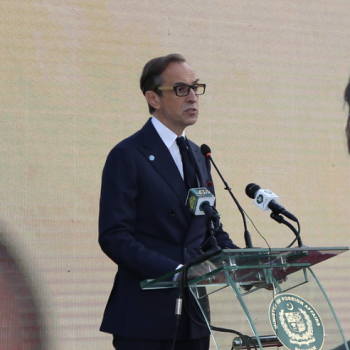Relief and long-term solutions for climate change disasters in Pakistan
*This Resident Coordinator performed functions in Pakistan from 2019 to 2023
The 2022 flooding in Pakistan, which uprooted millions of families across the country, has led to an urgent humanitarian emergency and posed long-lasting challenges to the country’s development. As Pakistan deals with the devastating impacts of the worst flooding in the country’s history, the role of the UN Resident Coordinator in leading the UN’s immediate and long-term response has been thrown into sharp focus.
- In partnership with the UN Office of Coordination of Humanitarian Affairs (OCHA), the Resident Coordinator has supported the roll-out of emergency humanitarian relief efforts to reach millions of people without access to food, shelter and other life-saving necessities.
- Concurrently, the Resident Coordinator is steering the rehabilitation and reconstruction phase following on UNDP’s leadership in conducting a post-disaster needs assessment along with the World Bank.
Dramatic as the flooding was, this climate catastrophe was not unexpected. After seeing the patterns of climate change that were laid bare during the previous (2020) severe floods, the Resident Coordinator led the full UN country team in an in-depth analysis of key climate-related risks facing Pakistan, foreseeing these emergencies and jointly planning a response.
- Country-wide consultations were conducted to inform this analysis, involving both national and provincial government and other development partners, identifying as a priority issue for the country the sustainable management of Pakistan’s water systems, especially the Indus River basin. The UN assisted the Ministry of Climate Change to develop a detailed report on the River Indus to devise a strategy to initiate its conservation and restoration as a living river.
- The new UN Sustainable Development Cooperation Framework – the agreed roadmap to advance the Sustainable Development Goals with the government for the period of 2023-2027 – includes as its central focus the ‘Living Indus’ Initiative, which constitutes the biggest climate initiative in the country’s history. Approved by Parliament in September 2022, the government also launched it at COP 27 (the 2022 United Nations Climate Change Conference). The Living Indus Initiative will cost $11-17 billion, and includes 25 initial priority interventions, with a central focus on adaptation and climate resilient growth. It will be supported by the Government, international financial institutions and relevant UN agencies on the ground, and will implement a range of different economic, environmental and social adaptation measures.
Read the Case Study on coordination results in Pakistan here.



